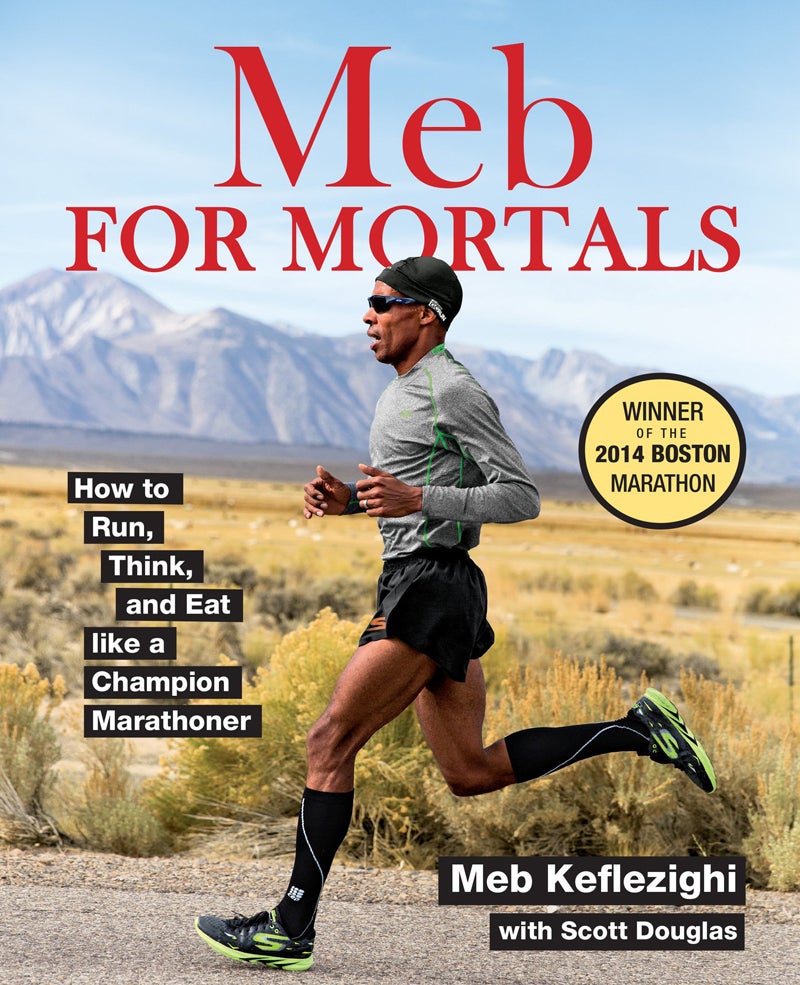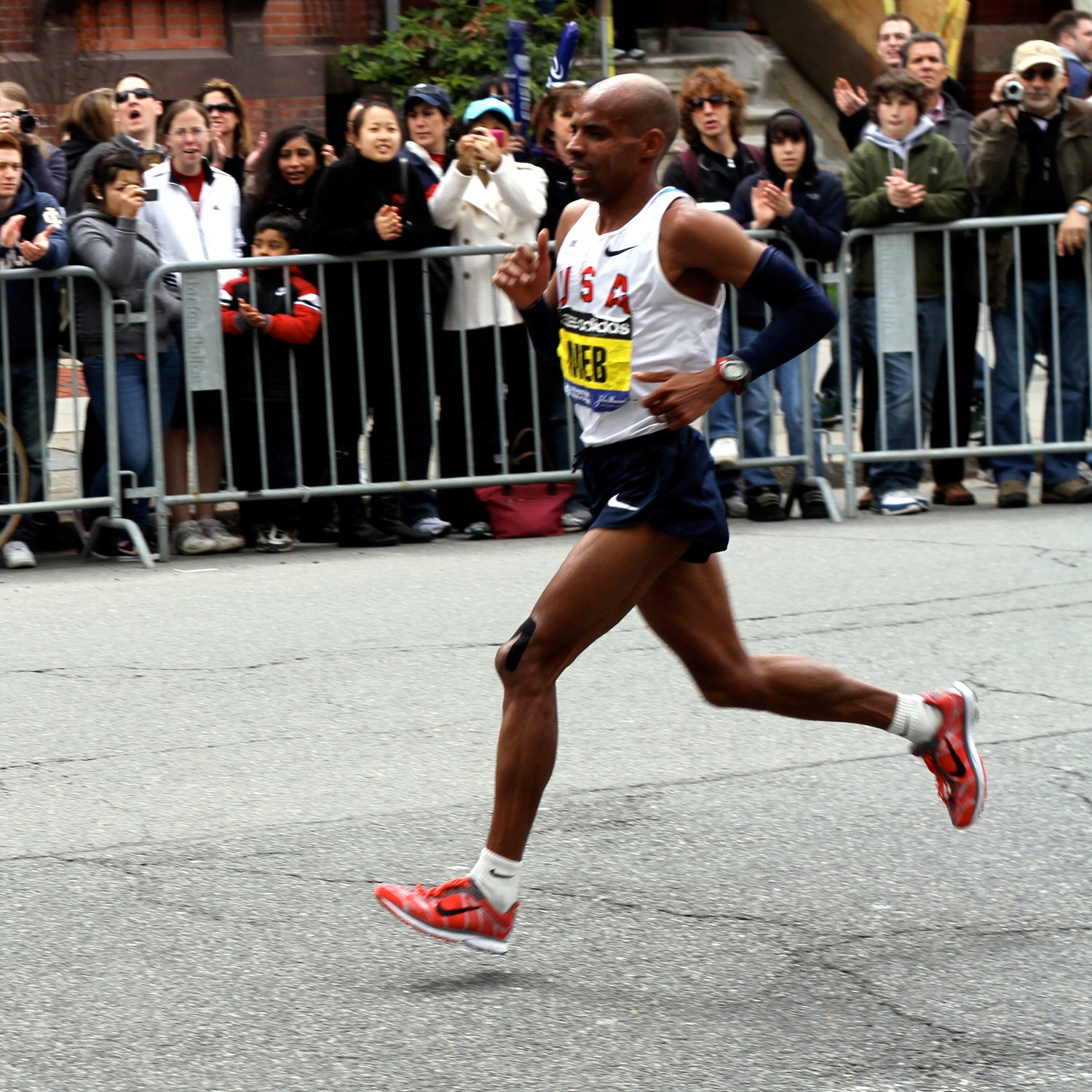Meb Keflezighi has no free time and no space left on his resume. In between races, serving as the vice president of running for Competitor magazine, fulfilling daddy duty for his three daughters, and logging heavy miles for the 2015 Boston Marathon on April 20, he has found time to publish his second book.
Meb for Mortals, out Tuesday, is an inside peek at the training regimen of arguably the best marathoner in U.S. history. It follows Keflezighi’s incredible feat last year when, two weeks shy of his 39th birthday, he won the 2014 Boston Marathon.
A guy that old winning a major marathon was unprecedented. But the victory meant so much more because it had been 30 years since the last American man had won the race, and it was the first race since the shocking finish-line bombing the year before. When the city and country needed a hero, Meb gave us someone to believe in.
Outside got in touch with Keflezighi to talk about his new book and to learn how to run from a man who appears to have tapped into the fountain of youth.
OUTSIDE: So first things first, why another book?
KEFLEZIGHI: To be able to share my secrets of training—well, they’re not secrets, but how to get the best out of yourself—and to share my wisdom, and the things I’ve learned over the last 25 years of running. I feel blessed to have the opportunity to share the story.
That sounds almost retrospective, despite the fact you just won Boston last year. When you look back at what you’ve done, does the Boston Marathon win carry greater importance?
Most definitely. To be able to pull off the victory after the bombing, it was the most meaningful victory of my life.
“Others have sent me texts or emails about training. Twenty-six miles is a long way—may the best man win. But advice should always be provided. If you keep it to yourself, you’re not doing justice to the sport.”
Your competitors had pretty much written you off as a podium finisher. Then you made an early move in Boston, which many consider a reckless strategy. What were you thinking?
What a race is, whether it’s 13.1 miles or 26.2 miles: It’s point A to point B. How you do it is completely up to you. The 2013 New York Marathon was a tough one for me. I finished 23rd and my competitors thought, “He ran 2:23 in New York. He’s going to falter in Boston.” So they thought they were letting me go. But really they didn’t let me go. I made a conscious decision to go.
A lot of people have written off Ryan Hall in the same way they have written you off. You guys used to train together in Mammoth Lakes, California. What do you think his chances are of rebounding?
Life is through ups and downs, and athletics is through ups and downs. It’s about how you come out of it. Ryan has been going through a lot of bad patches. Obviously we know what he can do—his resume speaks for itself. The question is, how do you retrieve that greatness?
As you get older, you have to gain confidence as to what you’ve done and what you’re still willing to do. You have to be able to push. People can say whatever they want to say, but you have to believe that what you’re doing day-in and day-out is up to you. I hope Ryan comes around.

After so many years at the top of American distance running, do you feel you have a responsibility to younger runners in the country?
I feel I have to be an example. Shalane Flanagan just sent me an email asking about altitude training. I provided what worked for me and the progression of how I got to where I am. She’s taken that advice, and hopefully it can pay dividends for her when she runs in Boston. Others have sent me texts or emails about training. Twenty-six miles is a long way—may the best man win. But advice should always be provided. If you keep it to yourself, you’re not doing justice to the sport.
Training guides like Meb for Mortals become scripture. But are there things in your book that you struggle with doing?
It’s still hard for me to take a day off, even though I know my body needs it. It’s hard because I’m so driven. Every two or three weeks, I should take a day off, but I don’t apply that as much as I should. It’s hard to hold back when you want to pile the miles and you’re healthy.
As you’ve built up for Boston this year, how many days have you taken off?
I took two days off at the beginning of the year—my calf got a little tight. I probably could have run the next day, but I said, you know what, take a day off, and then take another day off just to be sure. But I haven’t taken a day off in the last two months now.
Finally, why running?
Running is a beautiful thing. You go at your own pace, your own distance. And you know what? You get out of it what you put in it, and that’s why I became a runner and not a soccer player. It’s been such a rewarding sport.


